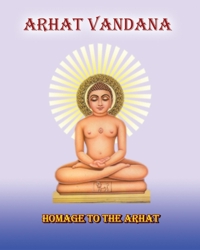| # | Arhat Vandana | Arhat Vandana - Meaning |
| 1 | Om hreem namo arahantānam Om hreem namo siddhānam Om hreem namo āyariyānam Om hreem namo uvajjhāyānam Om hreem namo loe savva sāhoonam. | I bow to the Arhats, the enlightened ones. |
| 2 | Eso pancha namukkāro, Savvapāvapanāsano. Mangalānam cha savvesim, Padhamam havai mangalam. | These five great salutations, destroy all our sins. Amongst all that is auspicious, this is the first and foremost |
| 3 | Je ya buddhā aikkantā, Je ya buddhā anāgayā. Santee tesim paitthānam, Bhooyānam jagaee jahā. | For all the Arhats of the past, |
| 4 | Se suyam cha me, ajjhatthiyam cha me - Bandhapamokkho tujjha ajjhattheva. | I have heard and experienced, |
| 5 | Purisā! Tumameva tumam mittam, Kim bahiyā mittamicchasi? | Oh man! You alone are your friend, so why then do you search for a friend outside? |
| 6 | Purisa! Attānameva abhinigijjha, Evam dukkhā pamokkhasi. | Oh man! Discipline yourself; it is the way to be free from pain. |
| 7 | Purisā! Tumansi nāma saccheva, J am "hantavvam" ti mannasi. | Oh man! The one whom you intend to kill (harm) is none other than yourself. |
| 8 | Savve pānā na hantavvā - | No creature in this world should be killed; t his is the eternal, perennial and unchanging law of non-violence. |
| 9 | Purisā! Sachameva samabhijānāhi | Oh man! Contemplate on truth and practise it. |
| 10 | Saccham bhayavam. | Truth is God. |
| 11 | Saccham loyammi sārabhooyam. | Truth is the essence of all that is. |
| 12 | Inameva niggantham pāvayanam saccham. | Only the sermon of the omniscient ones is true sermon. |
| 13 | Utthie no pamāyae. | A person who is aware or disciplined should not fall back in to a state of non-vigilance. |
| 14 | Savvato pamattassa bhayam, | A person who is non-vigilant has many fears. One who is awakened however has nothing to fear. |
| 15 | Samayā dhammamudhāhare muni. | The sage proclaims that religion is nothing but equanimity. |
| 16 | Lābhālābhe suhe dukkhe, Jivie marane tahā. Samo nindā pasansāsu, Tahā mānāvamānao. | One who maintains equanimity in loss or gain, pleasure or pain, life or death, criticism or praise, honour or disgrace is to be considered as an awakened one. |
| 17 | Anissio iham loe, Par aloe anissio. Vāsichandanakappo ya, Asane anasane tahā. | One who maintains equanimity remains unattached to the comforts of this life or next, remains neutral whether cut by a chisel or salved with sandal paste and whether offered food or having to remain starved. |
| 18 | Appā kattā vikattā ya, Duhāna ya suhāna ya. Appā mittamamittam cha, Duppatthiya suppatthio. | It is your own soul that is the maker and un-maker of pleasure and pain. The soul which is involved in good deeds is a friend whilst the soul which is involved in evil deeds is an enemy. |
| 19 | Appā nai veyarani, Appā me koodasāmali. Appā kāmaduhā dhenu, Appā me nandanam vanam. | My soul is like the Vaitarnee nadi (hellish river) and Kootshālmali vriksha (hellish tree) as well as like the Kāmadhenu (heavenly cow) and Nandanavan (heavenly garden). |
| 20 | Jo sahassam sahassānam, Sangāme dujjae jine. Egam jinejja appānam, Esa se paramo jao. | A warrior may conquer a million enemies on the battlefield; but the greater warrior is he who conquers himself. |
| 21 | Khāmemi savva jive, Savve jivā khamantu me. Mitti me savva bhooesu, Veram majjha na kenai. | I forgive all living creatures, may all of them forgive me. I have friendship with all living beings and enmity with none. |
| 22 | Arahantā mangalam, | The Arhats are auspicious, the Siddhas are auspicious, the Sādhus are auspicious, and the Jain Dharma is auspicious. |
| 23 | Arahantā loguttamā, | The Arhats are supreme, the Siddhas are supreme, the Sādhus are supreme, and the Jain Dharma is supreme. |
| 24 | Arahante saranam pavajjāmi, | I take refuge in the Arhats, I take refuge in the Siddhas, I take refuge in the Sādhus, and I take refuge in the Jain Dharma. |
Arhat Vandanā: 2.0 Arhat Vandanā - Meaning
Author:
 Acharya Tulsi
Acharya Tulsi
 Acharya Tulsi
Acharya Tulsi
Published: 18.11.2010
Updated: 24.11.2010
Updated: 24.11.2010
Sources
Arhat Vandana
Editors:Samani Prasanna Pragya,
Samani Rohit Pragya
Publisher: JVB London
Edition: 2008

Page glossary
Some texts contain footnotes and glossary entries. To distinguish between them, the links have different colors.
Page statistics
This page has been viewed 6598 times.